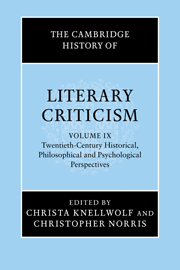Book contents
- Frontmatter
- Introduction
- HISTORY
- MARXISM AND POST-MARXISM
- 6 Marxism and literary criticism
- 7 Marxism and poststructuralism
- 8 Adorno and the early Frankfurt School
- 9 The ‘German–French’ debate: critical theory, hermeneutics and deconstruction
- 10 Post-war Italian intellectual culture: from Marxism to cultural studies
- FROM CULTURAL POETICS TO CULTURAL STUDIES
- PSYCHOANALYTIC APPROACHES
- GENDER AND SEXUALITY
- COLONIALISM, POST-COLONIALITY, NATION AND RACE
- MODERNITY AND POSTMODERNISM
- PHILOSOPHY, AESTHETICS AND LITERARY CRITICISM
- INTERDISCIPLINARY APPROACHES
- Bibliography
- Index
- References
8 - Adorno and the early Frankfurt School
from MARXISM AND POST-MARXISM
Published online by Cambridge University Press: 28 March 2008
- Frontmatter
- Introduction
- HISTORY
- MARXISM AND POST-MARXISM
- 6 Marxism and literary criticism
- 7 Marxism and poststructuralism
- 8 Adorno and the early Frankfurt School
- 9 The ‘German–French’ debate: critical theory, hermeneutics and deconstruction
- 10 Post-war Italian intellectual culture: from Marxism to cultural studies
- FROM CULTURAL POETICS TO CULTURAL STUDIES
- PSYCHOANALYTIC APPROACHES
- GENDER AND SEXUALITY
- COLONIALISM, POST-COLONIALITY, NATION AND RACE
- MODERNITY AND POSTMODERNISM
- PHILOSOPHY, AESTHETICS AND LITERARY CRITICISM
- INTERDISCIPLINARY APPROACHES
- Bibliography
- Index
- References
Summary
Although the Frankfurt Institute for Social Research was founded in 1924, the work of the Institute took on its distinctive theoretical character only after 1930, when the philosopher Max Horkheimer (1895–1973) became its director. At the core of Horkheimer's programme for the Institute was a commitment to multi-disciplinary, empirical social science projects, articulated within a Marxist social philosophy.
The Institute's Marxism (initially developed by Horkheimer along with Herbert Marcuse, 1898–1979) was firmly within the scope of western Marxism opened up by Georg Lukács’ History and Class Consciousness (1923). On the one hand, Marx was situated within the main tradition of German idealist philosophy, and thus as an inheritor of Kant and Hegel. On the other hand, Marx's own social and economic theories were developed in order to provide a more adequate account of twentieth-century capitalism than that provided by orthodox Marxism. The core concern of the Institute's research programme was the problem of the relationship between base and superstructure in late capitalism, articulated in terms of the connections between economic life, the psychological development of individuals, and changes within science, religion and art, law, custom, public opinion and popular culture. Psychological and cultural mechanisms were to be explicated in terms of their function in the continuing latency of objective class conflict. Thus, during the 1930s and 1940s, alongside the major Institute projects on anti-semitism, Nazism and authoritarianism, Institute members published on economic theory, class structure, trade unionism, law and the Asiatic mode of production, together with important theoretical and empirical work on mass and high culture.
- Type
- Chapter
- Information
- The Cambridge History of Literary Criticism , pp. 109 - 120Publisher: Cambridge University PressPrint publication year: 2001

